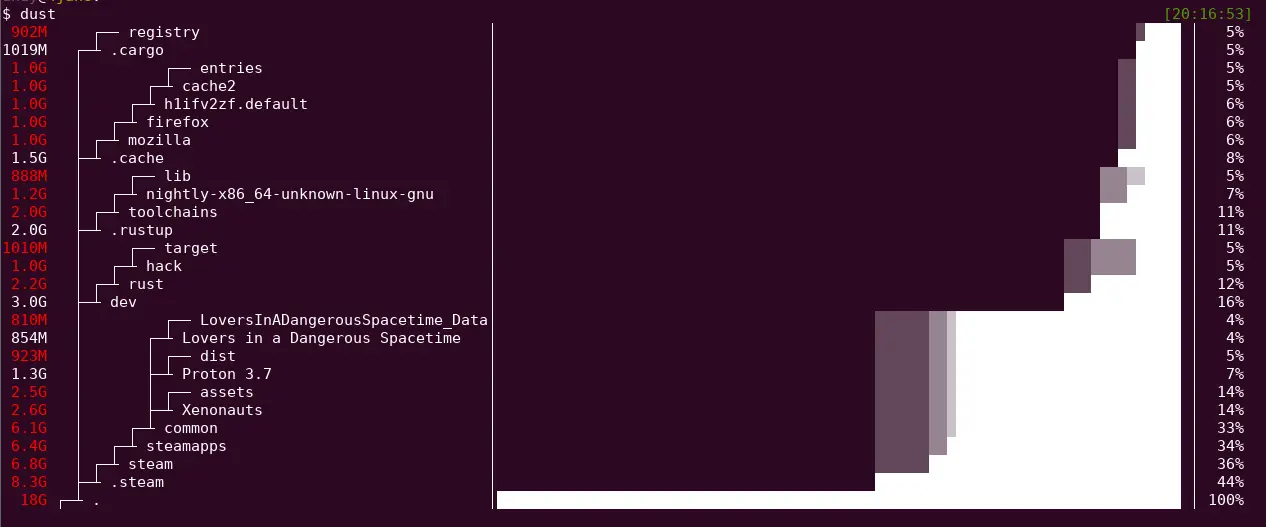

Oh even better! Thanks for the note


Oh even better! Thanks for the note


Agreed. The only way I see this helping the community is if folks post the outcome of discussions in a searchable way, like on the official Discourse. Most don’t.
If you’re determined to join a group like this, the Nix/NixOS Matrix is a better option since it’s already 4k+ strong.


I’m more of a dust man, myself. It runs recursively so it’s easy to pinpoint the culprit.

[Image source: the project’s README]


I’ve heard that a lot of custom domains get filtered by tech giants. Have you experienced any problems like that? I agree it would be nice and self hosting it is pretty straightforward.


Like?


This offers no features over the embedded calendar in the mail app. Not even widgets.


What is an option then?
I agree, the CLI is good enough. Thanks for the note about the GUI package manager! I hadn’t heard about that.
I also second the positive interactions. Mine have been almost exclusively positive. I’ve come across a few no effort “RTFM, idiot” attitudes but it’s rarer on Nix forums and repos than I’ve seen elsewhere.


Thanks for the note on Ditaa. I didn’t know it existed but I love the idea of rendering bitmaps from ASCII, especially on the web. It’s like Mermaid but the original syntax is a diagram in and of itself!
Like the author writes:
There is a number of formats that are text-based (html, docbook, LaTeX, programming language comments), but when rendered by other software (browsers, interpreters, the javadoc tool etc), they can contain images as part of their content. If ditaa was intergrated with those tools (and I’m planning to do the javadoc bit myself soon), then you would have readable/editable diagrams within the text format itself, something that would make things much easier. ditaa syntax can currently be embedded to HTML.
Oh that’s so cool! Thanks for the link.
When you say you host it live on Codeberg, do you mean something akin to GitHub pages? I didn’t know that existed


comin’ from one of those de-gens from up country, pick a fun name and sortyerselfout


I use this on my system! It’s been the only declarative flatpak mechanism I’ve gotten to work. Simple, easy to configure, and a descriptive systemd log. What more could you ask for
I prefer Syncthing-fork for some more straightforward configuration. Mainly the three button options equating to “follow the run conditions, damnit”, “run damnit”, and “stop damnit”


Even faster – tailscale. For a cheeky way to play with your friends make a burner account with a shared login to get on the same tailnet for free. On the endpoints, turn off tailscale-ssh and any of their other “features” you don’t need.
Second this ^
I have one and it’s fine, but not directly supported by OpenWRT. Looks like Beryl and Slate are though


Please don’t assume anything, it’s not healthy.
Explicitly stating assumptions is necessary for good communication. That’s why we do it in research. :)
it depends on the license of that binary
It doesn’t, actually. A binary alone, by definition, is not open source as the binary is the product of the source, much like a model is the product of training and refinement processes.
You can’t just automatically consider something open source
On this we agree :) which is why saying a model is open source or slapping a license on it doesn’t make it open source.
the main point is that you can put closed source license on a model trained from open source data


Quite aggressive there friend. No need for that.
You have a point that intensive and costly training process plays a factor in the usefulness of a truly open source gigantic model. I’ll assume here that you’re referring to the likes of Llama3.1’s heavy variant or a similarly large LLM. Note that I wasn’t referring to gigantic LLMs specifically when referring to “models”. It is a very broad category.
However, that doesn’t change the definition of open source.
If I have an SDK to interact with a binary and “use it as [I] please” does that mean the binary is then open source because I can interact with it and integrate it into other systems and publish those if I wish? :)
Unbelievable. What would we do? Hand it over to a non-profit akin to the Linux Foundation so we can have a flourishing ecosystem of technologies sharing momentum while branching out into their own flavors and augmentations? All of that, for what! To serve a public good via most common piece of software used on a day to day basis? Madness!